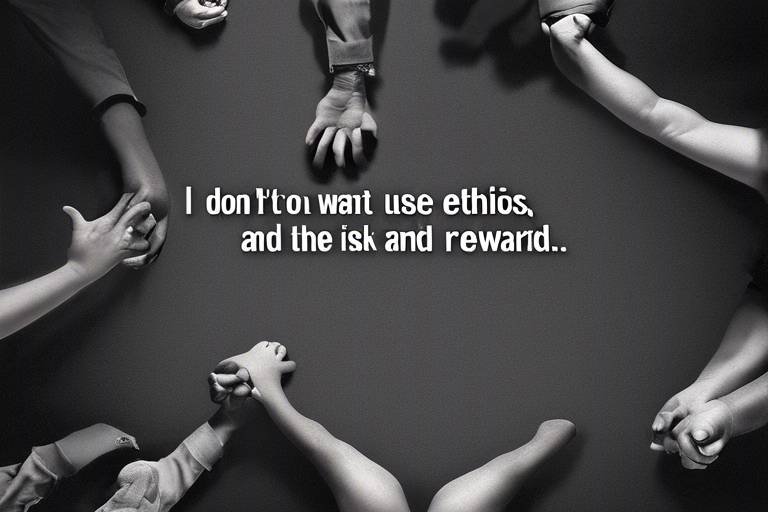The Philosophical Ethics of Risk and Reward
The intricate relationship between risk and reward has long been a subject of fascination and debate among philosophers, ethicists, and decision-makers alike. At its core, the exploration of this relationship invites us to ponder a fundamental question: how do we navigate the uncertain waters of life while making choices that align with our ethical principles? In a world brimming with ambiguity, where every decision carries the potential for both positive outcomes and unforeseen consequences, understanding the philosophical ethics of risk and reward becomes essential for informed decision-making.
Risk, in its essence, embodies the potential for loss or harm. It requires us to confront the unknown, to weigh our options carefully, and to consider the implications of our choices. The ethical dimension of risk is not merely about calculating probabilities; it involves a deeper reflection on our values, responsibilities, and the impact of our actions on others. For instance, when a business leader decides to invest in a new venture, they must assess not only the financial risks but also the ethical ramifications of their decision on employees, customers, and the community at large. This ethical lens transforms the act of risk-taking into a moral endeavor, compelling us to reflect on the broader consequences of our choices.
Conversely, reward serves as a powerful motivator, often enticing individuals to embrace risks they might otherwise avoid. Rewards can take many forms, from personal satisfaction and growth to tangible benefits like money and recognition. Yet, the pursuit of reward raises important ethical questions: Are we justified in seeking personal gain at the expense of others? How do we ensure that our rewards are aligned with ethical standards and do not lead to harm? These questions challenge us to consider the balance between self-interest and the well-being of others, prompting a deeper examination of the ethical landscape in which our decisions unfold.
To navigate the complexities of risk and reward, we must also explore the various ethical theories that provide frameworks for understanding our choices. From consequentialism, which evaluates the outcomes of actions, to deontology, which emphasizes duty and moral rules, each perspective offers unique insights into the ethical implications of risk-taking. By engaging with these theories, we can better understand how our values shape our decisions and how we can strive for a balance that honors both personal aspirations and ethical responsibilities.
Ultimately, the philosophical ethics of risk and reward invites us to engage in a thoughtful dialogue about our choices. It encourages us to be mindful of the risks we take, to reflect on the rewards we seek, and to consider the ethical dimensions that underlie our decision-making processes. As we navigate the uncertain terrain of life, let us embrace the complexity of these concepts and strive for a deeper understanding of how our choices impact not only ourselves but also the world around us.
- What is the relationship between risk and reward?
The relationship between risk and reward is foundational in decision-making, where taking risks can lead to various outcomes, including potential gains or losses. Understanding this relationship helps individuals make informed choices aligned with their ethical values. - How do ethical theories influence risk-taking?
Different ethical theories, such as consequentialism and deontology, provide frameworks for evaluating the moral implications of risk-taking. These theories guide individuals in assessing not just the outcomes of their actions but also their duties and responsibilities. - Can rewards be ethical?
Yes, rewards can be ethical when they align with moral principles and do not cause harm to others. It’s essential to consider the impact of rewards on individuals and society when making decisions that involve risk.

The Nature of Risk
Understanding risk is like peering into a foggy abyss, where the shadows of uncertainty loom large. At its core, risk is the potential of losing something of value, whether that be financial stability, health, or even reputation. Philosophically, risk can be defined as the probability of an adverse event occurring, coupled with the severity of its consequences. This dual nature of risk makes it a complex concept that intertwines with our ethical frameworks and decision-making processes.
When we consider risk, we often find ourselves at a crossroads, weighing the dangers against the potential for reward. This is where ethical considerations come into play. For instance, think about a tightrope walker performing high above the ground. The risk of falling is immense, yet the potential reward—such as fame, fortune, or personal satisfaction—can be equally compelling. This analogy highlights how risk is not merely a numerical value; it is a deeply personal decision influenced by our values, beliefs, and the societal norms that shape our understanding of what is acceptable.
Philosophically, risk can be categorized into two main types: calculated risk and unmanaged risk. Calculated risks are those that we take after thorough analysis and consideration of the possible outcomes. They are often associated with informed decision-making, where individuals weigh the pros and cons before proceeding. On the other hand, unmanaged risks are those that arise from impulsivity or lack of information, leading to unforeseen consequences. This distinction is crucial in ethical decision-making, as it raises questions about responsibility and accountability.
Moreover, the implications of risk extend beyond individual choices; they ripple through society. For example, consider the risks associated with environmental policies. A government might decide to implement strict regulations to reduce carbon emissions. The risk here involves balancing economic growth against the need for sustainability. If the regulations are too stringent, businesses may suffer, leading to job losses. However, if they are too lenient, the long-term consequences on the planet could be devastating. This intricate dance between risk and reward illustrates the ethical dilemmas that arise in public policy and collective decision-making.
In essence, the nature of risk is multifaceted, requiring us to navigate through a maze of uncertainties while remaining grounded in our ethical beliefs. As we delve deeper into the relationship between risk and reward, it becomes evident that our understanding of risk shapes not only our personal choices but also the fabric of society itself. The ethical implications of risk-taking are profound, and recognizing this complexity is vital for anyone seeking to make informed decisions in an unpredictable world.
- What is the difference between risk and uncertainty? Risk involves known probabilities of outcomes, while uncertainty refers to situations where the probabilities are unknown.
- How do ethical considerations impact risk-taking? Ethical considerations guide individuals in making decisions that balance personal gain with the potential consequences for others.
- Can risk be quantified? Yes, risk can often be quantified using statistical models, but the subjective nature of individual values complicates this process.

The Concept of Reward
When we think about rewards, we often picture shiny trophies, hefty paychecks, or even social media likes. But the concept of reward is far more nuanced than mere external validation. Rewards serve as powerful motivators that drive our actions and decisions, especially when faced with risks. They can be tangible or intangible, immediate or delayed, and their ethical significance can vary widely depending on the context in which they are considered.
At its core, the concept of reward can be broken down into two main categories: intrinsic rewards and extrinsic rewards. Each type carries its own ethical implications and influences our decision-making processes in unique ways. Understanding the difference between these two can help us navigate the often murky waters of risk and reward.
Intrinsic rewards are those that come from within. They are fueled by personal satisfaction, growth, and a sense of fulfillment. Think of the joy a writer feels when finishing a novel or the pride a volunteer experiences after helping their community. These rewards are deeply personal and often lead to a more profound sense of purpose. On the flip side, extrinsic rewards are external validations—like money, recognition, or promotions—that can sometimes overshadow intrinsic motivations. While extrinsic rewards can effectively motivate behavior, they can also lead to ethical dilemmas, especially when the pursuit of these rewards encourages risk-taking behavior that may not align with one’s values.
To illustrate this further, let’s consider some examples:
- Intrinsic Rewards: The satisfaction of learning a new skill, the sense of accomplishment from completing a challenging project, or the emotional fulfillment from helping others.
- Extrinsic Rewards: Financial bonuses, awards, or public recognition that come from achieving specific goals or milestones.
Both types of rewards play crucial roles in shaping our ethical frameworks. Intrinsic rewards often promote a sense of responsibility and ethical behavior because they are tied to personal values and self-concept. Conversely, extrinsic rewards can sometimes lead to ethical compromises, especially in high-stakes environments where the pressure to perform can cloud judgment.
As we navigate through life, it’s essential to find a balance between these two types of rewards. Striving solely for extrinsic rewards can lead to a hollow victory, where the joy of achievement is overshadowed by the stress and ethical dilemmas that arise from risky decisions. On the other hand, focusing exclusively on intrinsic rewards may result in missed opportunities for recognition and advancement in a competitive world.
Ultimately, the concept of reward intertwines with our understanding of risk. The ethical implications of our choices can shift dramatically based on whether we are motivated by intrinsic or extrinsic factors. This balance becomes even more critical in areas such as business and healthcare, where the stakes are high, and the consequences of our decisions can have far-reaching impacts.
As we dive deeper into the philosophical ethics of risk and reward, it’s vital to recognize that our motivations can significantly influence our ethical landscape. By understanding the nature of rewards, we can better navigate the complex decision-making processes that define our lives.
What are intrinsic rewards?
Intrinsic rewards are internal satisfactions that come from within, such as personal growth, fulfillment, and the joy of achieving something meaningful.
What are extrinsic rewards?
Extrinsic rewards are external validations that come from outside sources, such as money, recognition, or promotions, which can influence our behavior and decision-making.
How do intrinsic and extrinsic rewards affect ethical decision-making?
Intrinsic rewards often promote ethical behavior because they align with personal values, while extrinsic rewards can lead to ethical dilemmas, especially when the pursuit of these rewards encourages risky behavior.

Intrinsic vs. Extrinsic Rewards
When we talk about rewards, it's essential to understand the two primary categories: intrinsic and extrinsic. These terms might sound a bit technical, but they play a significant role in how we make decisions, especially when it comes to weighing risks. Intrinsic rewards are those that come from within. They are the feelings of satisfaction, personal growth, and fulfillment that we experience when we engage in activities that resonate with our values or passions. For instance, think about a musician performing on stage. The joy and exhilaration they feel while sharing their art with an audience is an intrinsic reward that often surpasses any monetary compensation.
On the flip side, extrinsic rewards are external factors that motivate us. These can include things like money, recognition, or promotions. While extrinsic rewards can be powerful motivators, they often come with their own set of ethical considerations. For example, consider a salesperson who is driven primarily by commission. Their focus on external rewards might lead them to take risks that compromise their integrity or the well-being of their clients. This raises an important question: do we prioritize the thrill of intrinsic rewards, or do we chase the tangible benefits that extrinsic rewards offer?
To illustrate the differences more clearly, let’s take a look at the following table:
| Type of Reward | Definition | Examples |
|---|---|---|
| Intrinsic Rewards | Internal satisfaction and fulfillment derived from an activity. | Personal growth, mastery of a skill, enjoyment of a hobby. |
| Extrinsic Rewards | External incentives that motivate behavior. | Money, awards, recognition, promotions. |
Understanding these two types of rewards is crucial for ethical decision-making. When we make choices based on intrinsic rewards, we often find ourselves in alignment with our core values, leading to a more fulfilling life. However, chasing extrinsic rewards can sometimes cloud our judgment, pushing us toward decisions that might not align with our ethical beliefs. This dynamic creates a fascinating tension: should we follow our passions, or should we prioritize the rewards that society often deems valuable?
Ultimately, the balance between intrinsic and extrinsic rewards can significantly influence our risk-taking behavior. For instance, someone who finds joy in helping others (an intrinsic reward) may be more willing to take risks in their career as a social worker, knowing that their work has a profound impact on people's lives. Conversely, someone driven by bonuses and promotions (extrinsic rewards) might take unnecessary risks in their corporate job, potentially compromising their ethical standards for the sake of financial gain.
As we navigate through life’s choices, it’s essential to reflect on what truly motivates us. Are we pursuing our passions for the joy they bring, or are we primarily motivated by external validation? This introspection can lead us to make more informed and ethical decisions when faced with risks and rewards.
- What are intrinsic rewards? Intrinsic rewards are internal motivations that provide personal satisfaction and fulfillment, such as joy from pursuing a passion.
- What are extrinsic rewards? Extrinsic rewards are external incentives, such as money or recognition, that motivate behavior.
- How do intrinsic and extrinsic rewards affect decision-making? Intrinsic rewards often lead to choices aligned with personal values, while extrinsic rewards can sometimes lead to ethical dilemmas.
- Can one type of reward be more beneficial than the other? It depends on the context; intrinsic rewards can lead to a more fulfilling life, while extrinsic rewards can provide necessary resources and recognition.

Examples of Intrinsic Rewards
When we talk about intrinsic rewards, we're diving into a realm where the motivation stems from within ourselves, rather than from external sources. These rewards are often the most profound and fulfilling because they align with our personal values, passions, and desires. Imagine a painter, lost in the strokes of their brush, creating a masterpiece not for fame or fortune, but simply for the joy it brings them. This is the essence of intrinsic reward—it's about the internal satisfaction that comes from pursuing what we love.
One of the most compelling examples of intrinsic rewards is personal growth. When individuals take risks—whether it's stepping out of their comfort zone to learn a new skill or challenging themselves in a demanding job—they often experience a sense of accomplishment that transcends any external validation. The journey of learning becomes a reward in itself, fostering a sense of confidence and self-efficacy. This can lead to a cycle where the more we grow, the more we want to take on new challenges, creating a rich tapestry of personal development.
Another dimension of intrinsic rewards is fulfillment. Consider the volunteer who dedicates their weekends to helping others. The reward they gain isn’t measured in monetary terms but rather in the joy of making a difference in someone’s life. This sense of purpose can be incredibly motivating, driving individuals to take risks that might seem daunting at first. It’s a reminder that sometimes, the greatest rewards come from acts of kindness and service.
Additionally, creativity plays a significant role in intrinsic rewards. Engaging in creative activities—be it writing, dancing, or crafting—allows individuals to express themselves and explore their identities. The risk of failure in these pursuits often pales in comparison to the joy of creation. The intrinsic satisfaction derived from the act of creating can be so powerful that it often outweighs any potential external accolades. This is where the magic happens; the act of creation itself becomes the reward.
In summary, intrinsic rewards are deeply personal and can take many forms. They often lead to a more fulfilling and meaningful life, as they encourage us to pursue our passions and values. Whether it's through personal growth, fulfillment, or creativity, these rewards remind us that the journey itself can be just as valuable as the destination.
- What are intrinsic rewards? Intrinsic rewards are internal motivations that provide personal satisfaction, such as personal growth, fulfillment, and creativity.
- How do intrinsic rewards differ from extrinsic rewards? Intrinsic rewards come from within and are driven by personal values, while extrinsic rewards are external validations like money or recognition.
- Can intrinsic rewards influence decision-making? Yes, intrinsic rewards can significantly impact our choices, often leading us to take risks that align with our passions and values.
- Why are intrinsic rewards important? They contribute to a deeper sense of fulfillment and happiness, encouraging continuous personal development and a meaningful life.

Examples of Extrinsic Rewards
When we talk about extrinsic rewards, we're diving into the world of external validation and incentives. These rewards are tangible and often come in the form of monetary benefits, recognition, or promotions. Unlike intrinsic rewards that stem from personal satisfaction and growth, extrinsic rewards can significantly influence our decision-making processes, especially when it comes to taking risks. Think about it: how often do we find ourselves motivated to pursue a goal because of a shiny prize at the end? This dynamic plays a crucial role in shaping our behaviors and choices.
For instance, in a corporate setting, employees might take on challenging projects not just for the sake of personal achievement but also for the prospect of bonuses or public acknowledgment. This can create a culture where the pursuit of external rewards overshadows intrinsic motivations, leading to a skewed perception of what success truly means. It raises an interesting question: Are we truly motivated by our passions, or are we merely chasing after the next big paycheck or trophy?
Extrinsic rewards can be categorized into several types, each with its own ethical implications:
- Monetary Rewards: This includes salaries, bonuses, and commissions. The temptation of financial gain can lead individuals to take risks they might otherwise avoid.
- Recognition: Awards, titles, and public accolades serve as powerful motivators. They can enhance one's reputation but may also pressure individuals to act in ways that align more with the expectations of others than their own ethical standards.
- Promotions: Climbing the corporate ladder often requires taking risks that can be ethically questionable. The desire for advancement can lead to conflicts between personal values and professional ambitions.
However, while extrinsic rewards can drive us to achieve remarkable feats, they can also create ethical dilemmas. For example, in the race for promotions, individuals might engage in cutthroat competition or even unethical practices, such as taking credit for others' work or manipulating outcomes to appear more favorable. This scenario highlights the delicate balance between striving for external rewards and maintaining ethical integrity.
Moreover, the challenge lies in the potential for extrinsic rewards to overshadow the intrinsic satisfaction derived from our efforts. When external validation becomes the primary motivator, it can lead to a sense of emptiness once the reward is achieved. People may find themselves asking, "Was it worth it?" This introspection is crucial, as it pushes us to reconsider our values and the true meaning of success.
In conclusion, while extrinsic rewards can be enticing and provide a clear incentive for risk-taking, it's essential to navigate this landscape with caution. Understanding the implications of these rewards, both positive and negative, can help individuals make more informed decisions that align with their ethical beliefs and personal values. After all, the ultimate question remains: how do we find a balance between external rewards and our intrinsic motivations in the pursuit of our goals?
- What are extrinsic rewards? Extrinsic rewards are external incentives that motivate individuals, such as money, recognition, and promotions.
- How do extrinsic rewards influence decision-making? They can drive individuals to take risks, sometimes leading to ethical dilemmas or decisions that conflict with personal values.
- Can extrinsic rewards overshadow intrinsic motivation? Yes, when external validation becomes the primary motivator, it can diminish the satisfaction derived from personal achievements.

The Balance of Risk and Reward
Finding the right equilibrium between risk and reward is crucial for making ethical decisions in life. Imagine standing at the edge of a diving board, looking down at the water below. The thrill of the jump is enticing, but so is the fear of hitting the water wrong. This is precisely how we navigate choices in our lives; we weigh the potential benefits against the possible downsides. In philosophical terms, this balance can often be a tightrope walk, where a slight miscalculation can lead to dire consequences or, conversely, unexpected rewards.
One way to conceptualize this balance is through various frameworks and theories that help us analyze our decisions. For instance, consider the Risk-Reward Ratio. This ratio is a tool used in finance and investment, but it can also be applied to personal decisions. It essentially asks: "What am I risking, and what do I stand to gain?" When making decisions, individuals often subconsciously calculate this ratio, weighing their potential losses against the expected benefits. The challenge arises when the risks are uncertain, and the rewards are not guaranteed, leading to a state of paralysis by analysis for many.
Moreover, ethical decision-making frameworks can provide guidance in navigating this balance. For example, the Utilitarian Approach suggests that we should aim for the greatest good for the greatest number. In this context, a decision that risks harm to a few might be justified if it leads to significant benefits for many. On the other hand, a Deontological Perspective emphasizes adherence to moral rules, suggesting that some risks should never be taken, regardless of the potential rewards. This dichotomy highlights the complexity of ethical decision-making, as individuals must often grapple with conflicting values and priorities.
To illustrate this further, let's consider a few scenarios:
| Scenario | Risk | Potential Reward | Ethical Consideration |
|---|---|---|---|
| Investing in Startups | High financial loss | High returns if successful | Is it ethical to gamble with others' money? |
| Medical Trials | Health risks for participants | Potential breakthroughs in treatment | Is it ethical to risk lives for progress? |
| Environmental Policies | Economic downturns | Long-term sustainability | Is it ethical to risk short-term pain for future gain? |
In each of these cases, the balance of risk and reward is not just a matter of numbers; it’s deeply intertwined with ethical considerations. The decisions we make can have lasting impacts, not only on ourselves but also on others. This is where the concept of moral responsibility comes into play. When we take risks, we must consider who else is affected by our choices. Are we risking our well-being alone, or does our decision impact friends, family, or even strangers?
Ultimately, finding the balance of risk and reward requires a mix of introspection and external input. Engaging in discussions with others, seeking advice, and reflecting on past experiences can help clarify our thoughts. The more we understand our values and the potential consequences of our actions, the better equipped we are to make ethical decisions that honor both our desires and the needs of those around us.
- What is the Risk-Reward Ratio? The Risk-Reward Ratio is a measure used to compare the potential profit of an investment to the potential loss. It's a critical tool in decision-making.
- How do ethical frameworks influence decision-making? Different ethical frameworks provide distinct perspectives on how to evaluate risks and rewards, guiding individuals in making more informed and responsible choices.
- Can taking risks ever be justified? Yes, risks can be justified if the potential rewards significantly outweigh the risks, especially when considering the greater good.

Ethical Theories and Risk
When we talk about ethical theories and their relationship with risk, we dive into a fascinating world where philosophy meets real-world dilemmas. Different ethical frameworks shape how we perceive and evaluate risks, leading to varied conclusions about what is deemed 'right' or 'wrong' when facing uncertainty. For instance, think about the last time you had to make a tough decision. Did you weigh the potential outcomes, or did you adhere to a set of rules? This difference in approach is what ethical theories illuminate.
One of the most prominent theories in this realm is consequentialism, which posits that the morality of an action is determined by its outcomes. In other words, if taking a risk leads to a positive result, it can be justified ethically. For example, consider a startup that invests heavily in a new technology. If the technology succeeds, it creates jobs and economic growth, making the risk worthwhile. However, if it fails, the consequences could be devastating, not only for the company but also for its employees and stakeholders. This underscores the importance of evaluating potential outcomes when assessing risk.
On the other hand, we have deontology, which emphasizes the importance of following rules and duties, irrespective of the outcomes. From this perspective, taking risks can be seen as unethical if it violates a moral duty. For instance, a doctor may refuse to perform a risky procedure on a patient if it goes against medical ethics, even if the procedure has a chance of saving the patient's life. This highlights a critical tension between the desire for positive outcomes and the adherence to moral principles.
Another vital perspective is provided by virtue ethics, which focuses on the character of the individual making the decision rather than the consequences or rules. In this view, the ethical choice involves considering what a virtuous person would do when faced with risk. This approach encourages individuals to cultivate traits such as courage, wisdom, and temperance, which can help navigate the murky waters of risk-taking. Imagine a firefighter who must decide whether to enter a burning building to save someone inside. Their decision is not just about the risk involved but also about embodying the virtues of bravery and selflessness.
To better understand these theories, let’s summarize the key differences in a table:
| Ethical Theory | Focus | Risk Evaluation |
|---|---|---|
| Consequentialism | Outcomes of actions | Justifies risk if outcomes are positive |
| Deontology | Rules and duties | Considers risk unethical if it violates moral duties |
| Virtue Ethics | Character and virtues | Evaluates risk based on personal virtues and moral character |
In conclusion, the interplay between ethical theories and risk-taking is complex and multifaceted. Each theory offers valuable insights into how we make decisions in uncertain situations. Whether we lean towards assessing outcomes, adhering to rules, or cultivating personal virtues, understanding these perspectives can enhance our ethical decision-making process. So, the next time you face a risky choice, consider not just what you stand to gain or lose, but also the ethical framework guiding your decision.
- What is the main difference between consequentialism and deontology? Consequentialism focuses on the outcomes of actions to determine morality, while deontology emphasizes adherence to rules and duties regardless of the outcomes.
- How does virtue ethics influence decision-making? Virtue ethics encourages individuals to consider what a virtuous person would do in a situation, promoting character development and moral integrity.
- Can risk-taking be considered ethical? Yes, risk-taking can be ethical if it aligns with the principles of the ethical framework being applied, such as positive outcomes in consequentialism.

Consequentialism and Risk
Consequentialism is a philosophical theory that posits that the morality of an action is determined solely by its outcomes. In the context of risk, this means that when making decisions, individuals weigh the potential benefits against the potential harms. For instance, consider a scenario where a company is deciding whether to launch a new product. The potential risks include financial loss, damage to reputation, and possible legal repercussions, while the rewards could encompass significant profit, market share expansion, and increased brand loyalty.
This framework encourages decision-makers to evaluate risks not just on their face value but in terms of the overall impact they may have. In essence, a consequentialist approach might justify taking a substantial risk if the anticipated rewards are deemed to outweigh the potential downsides. However, this perspective raises some ethical questions: Are we justified in risking harm to a few for the benefit of many? This dilemma is often illustrated through the trolley problem, a classic thought experiment in ethics.
In the trolley problem, one must decide whether to pull a lever to divert a runaway trolley onto a track where it will kill one person instead of allowing it to continue on its current track, where it will kill five people. From a consequentialist viewpoint, pulling the lever is the moral choice, as it minimizes overall harm. However, this also leads to further discussions about the value of individual lives and the moral weight of direct action versus inaction.
To better understand how consequentialism interacts with risk, let’s consider some key aspects:
- Outcome Evaluation: Decisions are made based on the predicted outcomes, which necessitates a careful analysis of potential risks and rewards.
- Utilitarian Approach: Many consequentialists adopt a utilitarian perspective, aiming for the greatest good for the greatest number, which can complicate risk assessment.
- Long-term vs. Short-term Outcomes: Evaluating the long-term consequences of a risky decision is crucial, as short-term gains can sometimes lead to long-term detriments.
The challenge lies in accurately predicting outcomes, as unforeseen consequences can arise from even the best-laid plans. This uncertainty makes risk-taking a complex ethical endeavor. For example, a company might launch a new technology that promises to revolutionize an industry but could also lead to significant job losses. In such cases, consequentialists must grapple with the ethical implications of their decisions, weighing immediate benefits against potential societal harm.
In conclusion, while consequentialism provides a robust framework for evaluating risk and reward, it is not without its challenges. The emphasis on outcomes requires a deep understanding of the potential impacts of decisions, and the ethical implications can be profound. As we navigate an increasingly complex world, the balance between risk and reward will remain a pivotal aspect of ethical decision-making, pushing us to constantly reassess our values and priorities.

Deontology and Risk
Deontological ethics, rooted in the philosophy of Immanuel Kant, emphasizes the importance of duty, rules, and the inherent morality of actions, regardless of their outcomes. In the context of risk, this perspective poses a fascinating challenge: how do we navigate the murky waters of uncertainty while adhering to a strict moral code? Imagine you’re at a crossroads, faced with a decision that could either lead to significant gains or devastating losses. A deontologist would argue that the moral integrity of your choice should take precedence over the potential consequences.
To illustrate this, consider a scenario where a medical professional must decide whether to administer a risky treatment to a patient. The treatment has a chance of saving the patient's life but also carries significant risks of severe side effects. A deontologist would focus on the duty to provide care and the ethical obligation to inform the patient about all possible risks, rather than solely weighing the potential positive outcomes against the negative ones. This duty to act ethically can sometimes lead to decisions that might seem less pragmatic but are aligned with moral principles.
Moreover, deontology challenges us to consider the concept of informed consent. This principle is crucial in situations involving risk, as it emphasizes the necessity of transparency and respect for the autonomy of individuals. When individuals are fully informed about the risks they face, they can make choices that align with their values and beliefs. This respect for autonomy is a cornerstone of deontological ethics, reinforcing the idea that the act of making a choice is as significant as the choice itself.
In the realm of business, deontological ethics also plays a critical role. Companies often face decisions that involve significant risks, such as launching a new product or entering a new market. A deontologist would argue that businesses have a duty to act ethically, even if that means foregoing potentially lucrative opportunities that could harm stakeholders or the environment. For instance, a company might decide against exploiting loopholes that would maximize profits but could lead to unethical labor practices. This decision reflects a commitment to ethical principles over mere profit-making.
Ultimately, the deontological approach to risk emphasizes that ethical decision-making is not merely about calculating potential rewards or avoiding losses. Instead, it is about adhering to a set of moral principles that guide our actions, even when the path forward is fraught with uncertainty. This perspective encourages us to reflect on our values and the implications of our choices, fostering a deeper understanding of what it means to act ethically in a complex world.
- What is deontology? Deontology is an ethical theory that emphasizes the morality of actions based on rules and duties rather than their consequences.
- How does deontology apply to risk-taking? Deontology focuses on the moral obligations and duties involved in decision-making, regardless of the potential outcomes.
- Can deontological ethics lead to negative outcomes? Yes, sometimes adhering strictly to deontological principles can result in decisions that may not yield the best outcomes, but they are morally justified.
- How does informed consent relate to deontological ethics? Informed consent is crucial in deontology as it respects individual autonomy and ensures that people are aware of the risks involved in their choices.

Case Studies in Risk and Reward
Analyzing real-world examples offers invaluable insights into the ethical dilemmas surrounding risk and reward. These case studies help us understand how different sectors navigate the often murky waters of decision-making under uncertainty. Let’s dive into some compelling instances that highlight the intricate balance between taking risks and reaping rewards.
One prominent case study comes from the world of finance, particularly the infamous 2008 financial crisis. Major banks and financial institutions took substantial risks by engaging in high-risk mortgage lending and trading complex financial instruments. The allure of potential rewards—massive profits from mortgage-backed securities—blinded many to the significant risks involved. When the housing market collapsed, it led to catastrophic consequences not only for the institutions involved but also for millions of individuals who lost their homes and livelihoods. This case illustrates how the pursuit of reward, without adequate risk assessment, can lead to disastrous outcomes.
In contrast, consider a healthcare scenario involving a groundbreaking but experimental drug. Pharmaceutical companies often face the ethical dilemma of balancing the potential benefits of a new treatment against the risks of adverse side effects. For instance, the development of a new cancer drug might promise significant improvements in survival rates, but it also comes with the risk of severe side effects that could harm patients. In such cases, the ethical considerations revolve around informed consent and ensuring that patients are fully aware of the risks involved in participating in clinical trials. Here, the reward is not just the financial gain for the company but also the potential for saving lives, which complicates the decision-making process.
Moreover, the tech industry provides another fascinating case study, particularly with companies like Uber and Lyft. These ride-sharing platforms took risks by disrupting traditional taxi services. The potential rewards included not only profits but also a more efficient transportation system. However, they faced ethical dilemmas related to driver safety, regulatory compliance, and the impact on traditional taxi drivers' livelihoods. The challenge lies in balancing innovation with ethical responsibilities, ensuring that while they pursue rewards, they do not compromise the well-being of their drivers or the communities they operate in.
To further illustrate these points, let’s consider a table summarizing the key aspects of these case studies:
| Case Study | Industry | Risk | Reward | Ethical Considerations |
|---|---|---|---|---|
| 2008 Financial Crisis | Finance | High-risk lending and trading | Massive profits | Impact on economy and individuals |
| Experimental Cancer Drug | Healthcare | Adverse side effects | Improved survival rates | Informed consent |
| Ride-Sharing Platforms | Technology | Driver safety, regulatory issues | Profit and efficiency | Impact on traditional jobs |
These case studies not only shed light on the complexities involved in decision-making but also emphasize the importance of ethical considerations in assessing risk and reward. They remind us that while the pursuit of reward can be enticing, it is crucial to weigh the potential risks and ethical implications carefully. Ultimately, the lessons learned from these examples can guide individuals and organizations in making more informed, ethical decisions in the face of uncertainty.
What is the relationship between risk and reward?
The relationship between risk and reward is fundamental in decision-making. Generally, higher risks are associated with the potential for higher rewards, but they also come with a greater chance of negative outcomes.
How can ethical considerations influence risk-taking?
Ethical considerations can significantly influence risk-taking by prompting individuals and organizations to weigh not just the potential financial gains but also the moral implications of their actions. This includes considering the impact on stakeholders, the environment, and society at large.
Can you provide an example of ethical decision-making in risk?
An example would be a company deciding to recall a defective product. While this may pose a financial risk, the ethical decision prioritizes consumer safety over profit, demonstrating a commitment to responsible business practices.

Business Ethics and Risk
In the fast-paced world of business, the interplay between risk and reward is not just a matter of financial strategy; it is deeply rooted in ethical considerations. When companies make decisions, they often face dilemmas that challenge their moral compass. For instance, should a corporation prioritize profit margins over environmental sustainability? Or should it invest in safer, albeit more expensive, technologies that protect both employees and the planet? These questions highlight the essential nature of business ethics in navigating risks.
One of the most significant aspects of business ethics is understanding how to balance the potential for profit against the risks that may harm stakeholders. Companies are not just accountable to their shareholders; they also have responsibilities to their employees, customers, and the communities in which they operate. This broader view of responsibility leads to a more holistic approach to risk management. For example, consider a company that decides to cut costs by outsourcing labor to a country with lax labor laws. While this may boost short-term profits, the long-term consequences could include public backlash, damage to the brand's reputation, and potential legal issues.
Furthermore, ethical frameworks can guide businesses in assessing risks. Many organizations adopt a stakeholder theory, which posits that businesses should consider the interests of all stakeholders—not just shareholders—when making decisions. This approach encourages companies to weigh the potential negative impacts of their actions on various groups. For instance, a business might conduct a risk assessment that includes:
- Employee safety and well-being
- Environmental impact
- Community relations
- Long-term brand reputation
Another critical consideration in business ethics is the transparency of decision-making processes. When companies are open about the risks they take and the reasons behind their choices, they build trust with stakeholders. Transparency allows for informed discussions about the ethical implications of risk-taking. For example, if a company chooses to launch a new product that may have some safety risks, being upfront about these risks can foster a sense of accountability and allow consumers to make informed choices.
Moreover, the consequences of unethical risk-taking can be severe. Companies that prioritize short-term gains over ethical considerations often face significant backlash. This can manifest in various forms, such as consumer boycotts, legal penalties, or damage to brand loyalty. A notable example is the Volkswagen emissions scandal, where the company faced immense repercussions for prioritizing profit over environmental responsibility. This incident serves as a potent reminder that the risks associated with unethical behavior can far outweigh any potential rewards.
Ultimately, the relationship between business ethics and risk is complex and multifaceted. Companies must navigate this landscape with care, recognizing that ethical decision-making is not just about avoiding negative outcomes but also about fostering a culture of integrity and responsibility. By aligning their business strategies with ethical principles, organizations can not only mitigate risks but also enhance their long-term viability and success.
- What is the importance of ethics in business decision-making?
Ethics in business ensures that companies consider the impact of their decisions on all stakeholders, fostering trust and long-term success. - How can businesses balance risk and reward ethically?
By adopting frameworks like stakeholder theory and conducting thorough risk assessments, businesses can make informed decisions that prioritize ethical considerations. - What are the consequences of unethical risk-taking?
Unethical risk-taking can lead to legal issues, damage to reputation, and loss of consumer trust, which can be detrimental to a company's long-term success.

Healthcare Decisions and Risk
In the realm of healthcare, the interplay between risk and reward takes on profound significance. Medical professionals are often faced with challenging decisions that can have life-altering consequences for their patients. These decisions require a delicate balance between the potential benefits of a treatment or intervention and the inherent risks involved. For instance, consider a patient diagnosed with a serious condition who is presented with the option of undergoing a high-risk surgery that could potentially save their life. The surgeon must weigh the potential rewards of a successful operation against the risks of complications or even mortality.
Moreover, the ethical implications of these decisions extend beyond the individual patient to encompass broader societal considerations. Healthcare providers must navigate a complex landscape of patient autonomy, informed consent, and the duty to do no harm. This often leads to difficult questions: How much information should be disclosed to patients about potential risks? Should a healthcare provider prioritize a patient's immediate desires over long-term health outcomes? These dilemmas highlight the importance of ethical frameworks in guiding healthcare decisions.
To illustrate these complexities, let's explore a few key factors that influence healthcare decisions:
- Patient Autonomy: Respecting a patient's right to make informed choices about their treatment is paramount. However, this can clash with the provider's responsibility to recommend the safest options.
- Informed Consent: Patients must be adequately informed about the risks and rewards of their treatment options. This process requires clear communication and transparency.
- Risk Assessment: Healthcare professionals must evaluate the risks associated with various treatments, considering both statistical data and individual patient factors.
Additionally, the concept of shared decision-making has gained traction in recent years, emphasizing the collaborative nature of healthcare decisions. This approach encourages healthcare providers and patients to work together to understand the risks and rewards, fostering a sense of partnership and trust. By engaging patients in their care, providers can help ensure that treatment decisions align with the patient's values and preferences.
As we navigate the intricate landscape of healthcare decisions, it's essential to recognize that the stakes are often high. The impact of these choices can resonate throughout a patient's life, affecting not only their health but also their emotional and psychological well-being. Therefore, ethical considerations must remain at the forefront of discussions surrounding risk and reward in healthcare.
In conclusion, the ethical dilemmas faced by healthcare professionals when making decisions that impact patient outcomes are multifaceted and complex. By understanding the nuances of risk and reward, and by prioritizing ethical considerations such as patient autonomy and informed consent, healthcare providers can make more informed decisions that ultimately benefit their patients and society as a whole.
- What is the role of informed consent in healthcare decisions? Informed consent ensures that patients understand the risks and benefits of a treatment before agreeing to it, promoting autonomy and ethical practice.
- How do healthcare providers assess risks? Providers evaluate risks using clinical guidelines, statistical data, and individual patient factors to make informed decisions.
- What is shared decision-making? Shared decision-making is a collaborative approach where healthcare providers and patients work together to make treatment choices that align with the patient's values.
Frequently Asked Questions
- What is the philosophical definition of risk?
Risk, in philosophical terms, refers to the potential for loss or harm when facing uncertain situations. It involves evaluating the likelihood of negative outcomes and the ethical implications of those outcomes in decision-making processes.
- How do intrinsic and extrinsic rewards differ?
Intrinsic rewards are those that come from within, like personal satisfaction and growth. In contrast, extrinsic rewards are external, such as money or recognition. Understanding this distinction is crucial as it influences our motivations and ethical considerations when taking risks.
- Why is balancing risk and reward important?
Finding a balance between risk and reward is essential for ethical decision-making. It helps individuals and organizations navigate uncertainties while considering the potential consequences of their choices, ensuring that decisions align with their values and ethical principles.
- What role do ethical theories play in understanding risk?
Different ethical theories, such as consequentialism, deontology, and virtue ethics, provide unique perspectives on risk-taking. They help us analyze the moral implications of our actions and the importance of outcomes, duties, and character in decision-making under uncertainty.
- Can you give an example of a case study involving risk and reward?
One notable case study in business ethics involves corporate decisions where companies must weigh financial risks against potential rewards. These situations often highlight the ethical dilemmas faced by leaders when balancing profit motives with social responsibility.
- How do healthcare professionals approach risk in their decisions?
Healthcare professionals frequently encounter ethical dilemmas that require them to weigh the risks of treatments against potential benefits for patients. Their decisions must consider not only medical outcomes but also the ethical implications of their choices on patient well-being.



















